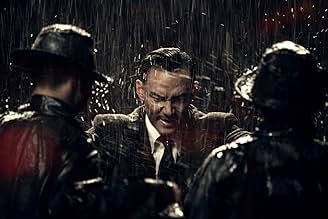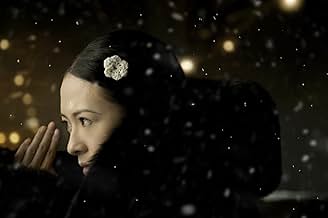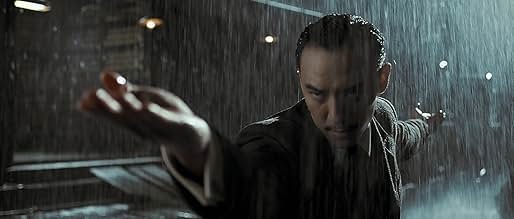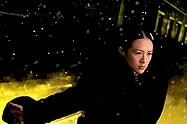AVALIAÇÃO DA IMDb
6,6/10
37 mil
SUA AVALIAÇÃO
A história do mestre de artes marciais Ip Man, o homem que treinou Bruce Lee.A história do mestre de artes marciais Ip Man, o homem que treinou Bruce Lee.A história do mestre de artes marciais Ip Man, o homem que treinou Bruce Lee.
- Indicado a 2 Oscars
- 68 vitórias e 72 indicações no total
Tony Leung Chiu-wai
- Ip Man
- (as Tony Leung)
Elvis Tsui
- Mr. Hung
- (as Jinjiang Xu)
Kar-Yung Lau
- Master Yong
- (as Chia Yung Liu)
Chi Wah Ling
- Foshan Martial Artist
- (as Tony Ling)
Enredo
Você sabia?
- CuriosidadesThe project was announced almost 10 years before its final release, due to director Wong Kar-Wai's endless perfectionism. Several other motion pictures about the Ip Man that were conceived after this announcement (most famously O Grande Mestre (2008) and O Grande Mestre 2 (2010)) were all released in the meantime.
- Versões alternativasThe original version released in Asia removes a portion of Yi Xintian's subplot. The rain fight sequence between Xintian and Ip Man shown in the trailer, for example, was removed. However, Wong Karwai then recut the movie for a special Berlin Film Festival screening by incorporating the missing scenes back, but editing out several scenes from the original version including a fight sequence between Ip Man and a Hong Kong challenger. Both versions are missing crucial segments that made all three main characters' journey feel incomplete. The actual finished movie was rumored to be 4 hours long. Wong Karwai mentioned he had no intention of releasing the 4 hour version.
- ConexõesFeatured in Cerimônia do Oscar 2014 (2014)
Avaliação em destaque
Surely, this is a compromised film. Years in the making, and has one foot in the blockbuster league which means it has to address a wide audience, satisfy investors and make a healthy recoup—in the Chinese market, it did. What both these mean is that Kar Wai had to set up artificial limits to his vision, then swim to real ones, limits he cares to meet as an artist, then see how swiftly he can move back and forth.
But let's not mince words here. Kar Wai is a cinematic master. And I'm sure I will remember this as one of the most interesting, most wonderful, most visual films of the year come December.
Right off the bat, you should know that if you want the clean, rousing version of Ip Man you should go to the Donnie Yen films. It's a legend anyhow, most martial arts stories are (especially the Chinese), embellished in the telling. So if you want 'truth', you're looking in the wrong place to begin with. About Ip Man, you should know that the fighting style he is supposed to have originated called wing chun, at least as taught now, takes some old Taoist notions about softness and intuited flow and creates a uselessly complicated and scholastic system of study.
But the notions are powerful, and this is likely what attracted Kar Wai to a film about him.
So the artificial limits here are the kung fu movie, a type of narrative deeply embedded in the national character. So we get familiar history as the backdrop, Civil War, Japanese invasion and so forth. The film will be familiarly lush and operatic for the Chinese. It also means we get fights, we do—some marvelous ones. It means we get the heroic portrait—the good vs evil sifus, tied to contrasted history, tied to the passing of tradition. The kungfu plot revolves around preserving the secret 64 moves and avenging the old master's death, usual tropes in this type of film.
But he sets all this up in order to break it, that's what Ip Man's talk about breaking the cake represents in his standoff with the old master of the northern school, contrasted to his belief that it should be whole—metaphorically referring to a strong, unified China, the same obsession with fabricated harmony that powers both the political and martial arts narratives over there.
This is what Kar Wai does, he breaks the harmonies.
Not so much in the fights: Kar Wai plays with them like a master painter fools with paint in commissioned work. He plays with speeds, textures and choreographed impacts but does not radically push the language like he did in Ashes. Ashes really was a radical break in temporal experience, wonderful stuff with many layers. Here, we experience fights cleanly, in a way that will satisfy the broad audience.
He breaks the heroic narrative: in his worldview, time does not linearly build to the 'big fight', it happens with one third of the film to go and Ip Man is not in it, what should have been a dramatic death happens offscreen, history is glimpsed off the streets, we get flashbacks and forwards, abstraction and long visual poetry. And the 64 moves are never passed on. All that fooling with structure is a way of loosening limits of genre and tradition, inherited limits to vision.
But what is really worth it here, is watch him swim to meet his own limits—multilayered reflection on memory as living space for the eye.
In martial arts terms, that means soft, yielding to inner pull, to the hardness of fights, politics and quasi-mythical narrative. It means every hard narrative thrust in the name of tradition, country or lineage, becomes an anchor he uses to submerge me in visual exploration of feelings. In visitation of spaces of desire, flows. Sure, it is not as successful as previous projects, because the fancy fights and exotic settings get in the way, jarring me from a tangible experience. But it's still pretty much the same wonderful swimming, each thrust of the hand creating turbulent patterns in water.
For instance, the daughter waiting in the train station to avenge the old master is the anchor. But between that first shot and the decisive encounter, we get a wonderful current of images; cooking smoke at night, snow, refracted light through windows, children running. These are not of the story, but snow flakes of remembrance the air drags in. The cut from statues of Buddha to grainy footage of bustling Hong Kong is one of the most thunderous edits I've seen. And the entire last third of the film is purely a Kar Wai film; all about unrequited yearnings, ashes of youth in a gilded box.
So spliced inside the kung fu comic-book is a sort of Mood for Love where again we had the contrast to 'hard' fabrication in the writer of kung fu stories.
It is muddled, because you can't have crispness when the whole point is a fluid recall. Tarkovsky is 'muddled'. But it's so lovely overall.
The coveted moves as the excuse for the man and woman to meet attempting touch, the Taoist pushing and yielding of hands to be close.
They are empty hand forms, in that there is nothing to be grasped beyond the shared flow. It is all about cultivating sensitivity, listening, placement in space.
But let's not mince words here. Kar Wai is a cinematic master. And I'm sure I will remember this as one of the most interesting, most wonderful, most visual films of the year come December.
Right off the bat, you should know that if you want the clean, rousing version of Ip Man you should go to the Donnie Yen films. It's a legend anyhow, most martial arts stories are (especially the Chinese), embellished in the telling. So if you want 'truth', you're looking in the wrong place to begin with. About Ip Man, you should know that the fighting style he is supposed to have originated called wing chun, at least as taught now, takes some old Taoist notions about softness and intuited flow and creates a uselessly complicated and scholastic system of study.
But the notions are powerful, and this is likely what attracted Kar Wai to a film about him.
So the artificial limits here are the kung fu movie, a type of narrative deeply embedded in the national character. So we get familiar history as the backdrop, Civil War, Japanese invasion and so forth. The film will be familiarly lush and operatic for the Chinese. It also means we get fights, we do—some marvelous ones. It means we get the heroic portrait—the good vs evil sifus, tied to contrasted history, tied to the passing of tradition. The kungfu plot revolves around preserving the secret 64 moves and avenging the old master's death, usual tropes in this type of film.
But he sets all this up in order to break it, that's what Ip Man's talk about breaking the cake represents in his standoff with the old master of the northern school, contrasted to his belief that it should be whole—metaphorically referring to a strong, unified China, the same obsession with fabricated harmony that powers both the political and martial arts narratives over there.
This is what Kar Wai does, he breaks the harmonies.
Not so much in the fights: Kar Wai plays with them like a master painter fools with paint in commissioned work. He plays with speeds, textures and choreographed impacts but does not radically push the language like he did in Ashes. Ashes really was a radical break in temporal experience, wonderful stuff with many layers. Here, we experience fights cleanly, in a way that will satisfy the broad audience.
He breaks the heroic narrative: in his worldview, time does not linearly build to the 'big fight', it happens with one third of the film to go and Ip Man is not in it, what should have been a dramatic death happens offscreen, history is glimpsed off the streets, we get flashbacks and forwards, abstraction and long visual poetry. And the 64 moves are never passed on. All that fooling with structure is a way of loosening limits of genre and tradition, inherited limits to vision.
But what is really worth it here, is watch him swim to meet his own limits—multilayered reflection on memory as living space for the eye.
In martial arts terms, that means soft, yielding to inner pull, to the hardness of fights, politics and quasi-mythical narrative. It means every hard narrative thrust in the name of tradition, country or lineage, becomes an anchor he uses to submerge me in visual exploration of feelings. In visitation of spaces of desire, flows. Sure, it is not as successful as previous projects, because the fancy fights and exotic settings get in the way, jarring me from a tangible experience. But it's still pretty much the same wonderful swimming, each thrust of the hand creating turbulent patterns in water.
For instance, the daughter waiting in the train station to avenge the old master is the anchor. But between that first shot and the decisive encounter, we get a wonderful current of images; cooking smoke at night, snow, refracted light through windows, children running. These are not of the story, but snow flakes of remembrance the air drags in. The cut from statues of Buddha to grainy footage of bustling Hong Kong is one of the most thunderous edits I've seen. And the entire last third of the film is purely a Kar Wai film; all about unrequited yearnings, ashes of youth in a gilded box.
So spliced inside the kung fu comic-book is a sort of Mood for Love where again we had the contrast to 'hard' fabrication in the writer of kung fu stories.
It is muddled, because you can't have crispness when the whole point is a fluid recall. Tarkovsky is 'muddled'. But it's so lovely overall.
The coveted moves as the excuse for the man and woman to meet attempting touch, the Taoist pushing and yielding of hands to be close.
They are empty hand forms, in that there is nothing to be grasped beyond the shared flow. It is all about cultivating sensitivity, listening, placement in space.
- chaos-rampant
- 22 de jun. de 2013
- Link permanente
Principais escolhas
Faça login para avaliar e ver a lista de recomendações personalizadas
- How long is The Grandmaster?Fornecido pela Alexa
Detalhes
- Data de lançamento
- Países de origem
- Centrais de atendimento oficiais
- Idiomas
- Também conhecido como
- The Grandmaster
- Locações de filme
- Empresas de produção
- Consulte mais créditos da empresa na IMDbPro
Bilheteria
- Orçamento
- US$ 38.600.000 (estimativa)
- Faturamento bruto nos EUA e Canadá
- US$ 6.594.959
- Fim de semana de estreia nos EUA e Canadá
- US$ 132.617
- 25 de ago. de 2013
- Faturamento bruto mundial
- US$ 73.933.255
- Tempo de duração2 horas 10 minutos
- Cor
- Mixagem de som
- Proporção
- 2.35 : 1
Contribua para esta página
Sugerir uma alteração ou adicionar conteúdo ausente


























